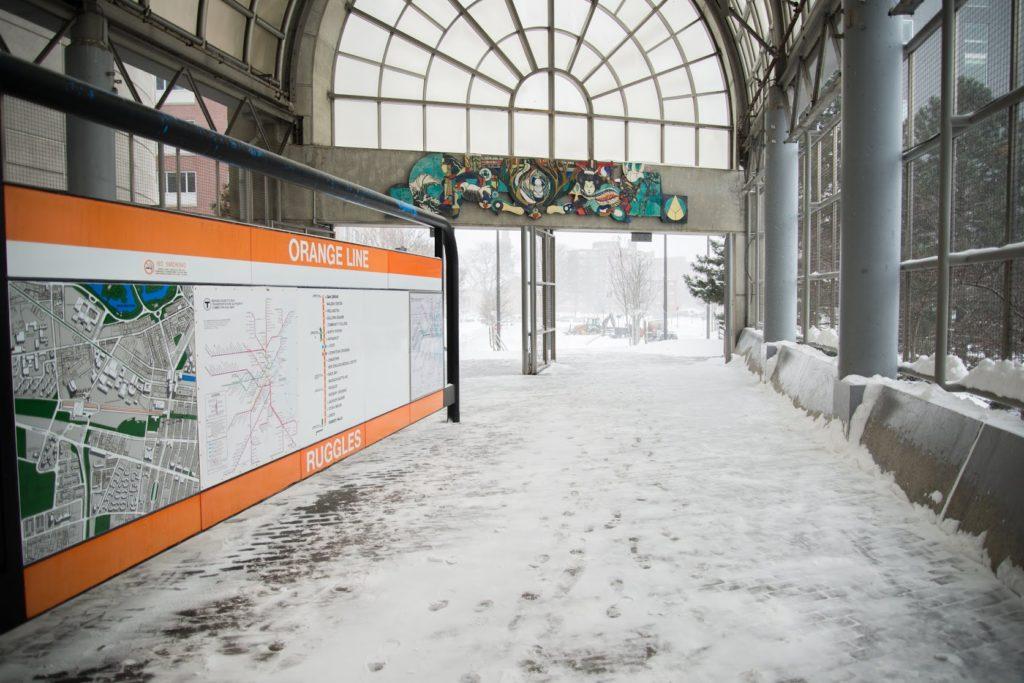By Rachel Morford, news correspondent
One year removed from a winter of record-setting snow totals, blocked streets and broken trains, city officials and the Massachusetts Bay Transportation Authority (MBTA) are preparing for winter early in hopes of avoiding a similar fate.
The MBTA has begun implementing a Winter Resiliency plan, promising to keep trains more functional throughout the season. The city’s Public Works Department (BPW) has instituted policy changes and stocked up on equipment it says will help fight the effects of blizzards and snow drifts.
Last winter, the city was unprepared for the record 110.6 inches of snowfall it received. For the fiscal year, officials budgeted $18.5 million for snow removal, but by mid-February had spent $33 million. Snow piles overwhelmed streets, and a myriad of problems plagued the transit system.
“It is critical that preparations are in place in terms of having adequate snow removal equipment and needed infrastructure upgrades, in the event of another harsh winter,” Jason Johnson, MBTA deputy press secretary, said in an email to The News. “[The] Red and Orange Lines will undergo third rail and switch heaters replacement… [and] there will be new snow fencing on critical portions of above-ground track.”
These improvements are part of the five-year, $83.7 million resiliency plan. Other changes coming this winter include a revised snow emergency protocol and stronger communication with riders, according to Johnson.
The MBTA’s winter woes – which included short-circuited equipment and impassable tracks – caused harrowing experiences for many people.
“Waking up each morning, knowing that the T was down and that it was freezing and probably windy outside… it was hopeless, oppressive, desolate [and] pretty much every word for awful,” Carissa Lellos, third-year psychology major at Northeastern, said.
The BPW plans to battle the upcoming winter with heavy machinery, spokeswoman for Mayor Martin J. Walsh Samantha Ormsby said in an email to The News.
“This past June, Public Works purchased two large-scale truck-mounted snow blowers to more efficiently clear Boston’s streets during periods of heavy snowfall,” Ormsby said. “The two new pieces of equipment have the ability to throw 2,750 tons of snow per hour with a casting distance of up to 150 feet.”
Officials plan to pair the snow-blowing trucks with dump trucks that will catch snow as the blowers remove and cart it away to designated disposal sites, according to Ormsby. The new system is intended to aid BPW in clearing roads – one of its biggest challenges last year.
“This past winter, over 1 billion cubic square feet of snow fell in Boston,” Ormsby said. “Public works plowed 295,000 miles of roadway, roughly 12 trips around the Earth, removed over 40,000 truckloads of snow from city streets and melted 50,000 tons of snow at snow farms.”
Boston’s budget for snow removal has been increased by $4.1 million. The city has also prepared service contracts in advance to avoid running out of essential provisions, like snowmelt and road salt, once snow begins to fall.
Odds are, it will be a while before Boston sees another winter as harsh as last year’s, according to Dr. Auroop Ganguly, director of Northeastern University’s Sustainability & Data Sciences Laboratory. However, officials will never be able to control for the unpredictability of snowfall, he said.
“Forecasting weather, or seasonal climate, if you will, at this scale is really difficult,” Ganguly said. “Seasonal climate projections are so uncertain that even the Old Farmer’s Almanac has a decent following [as a source of prediction].”
The Almanac predicts cold weather and above-average snowfall.
Students expressed mixed opinions on the city and MBTA’s plans.
“It just seems like a lost cause,” Mitali Mirle, sophomore environmental science major, said. “It was my first white winter ever, and I loved it – for, like, the first three minutes.”
Better planning, more attention on the issue and milder weather should put Boston in a good place to handle this year’s winter, according to Brian Helmuth, professor in the College of Science and School of Public Policy and Urban Affairs at Northeastern.
“I don’t blame the City of Boston completely for the shutdown [last year],” Helmuth said. “It was indeed too much snow, not enough money and not enough places to put it… but in the longer run it will depend more on careful planning – this is not the last time we’ll see this kind of thing, I am sure.”
Climate change will likely put increased stress on the public to handle extreme weather situations, Helmuth continued.
“Dealing with higher highs, lower lows, stronger storms and greater snowfall is becoming a fact of life due to climate change, which doesn’t show any signs of slowing down,” Helmuth said. “We definitely could be doing more, but overall, the City of Boston is more progressive than many US cities… in preparing for climate change.”
Photo by Scotty Schenck





![A demonstrator hoists a sign above their head that reads, "We [heart] our international students." Among the posters were some listing international scientists, while other protesters held American flags.](https://huntnewsnu.com/wp-content/uploads/2025/06/image12-1200x800.jpg)



